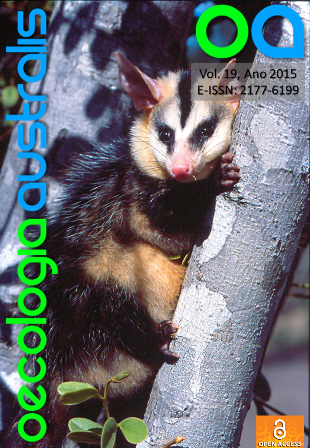FROM SIMPLE QUESTIONS TO COMPLEX ANSWERS: A RESEARCH PROGRAM BASED ON DIET SELECTION AND WATER BALANCE OF SMALL MAMMALS
DOI:
https://doi.org/10.4257/oeco.2015.1901.03Keywords:
digestive morphology, food habits, nutrition, trophic niche, water balance, ecophysiologyAbstract
Information on key biological traits is fundamental to understand complex ecological processes, and to develop mechanistic models of geographic distributions and community structure based on functional attributes. These ideas were the main motivation behind pioneer studies on food habits, diet selection, and ecophysiology of small mammals coordinated by Dr. Rui Cerqueira at the Laboratório de Vertebrados (LABVERT) of Universidade Federal do Rio de Janeiro (UFRJ). Here we review his research program and his most important contributions on diet selection and water balance, which were studied to understand community structure, biogeography, and species distribution. Studies of diet selection varied from fecal content analyzes to comparative morphometric and anatomical studies of digestive organs, and its relations to diet digestibility. One of the main contributions was the development of a method to experimentally establish diet selection and food preference in laboratory. Previously, most Neotropical marsupials were simply described as omnivorous, but using this method it was possible to detect that species are distributed along a gradient of nutrient and food consumption, from frugivory to carnivory. A study of the water balance and urine concentration by the marsupial Philander frenatus supported the hypothesis that it is dependent on mesic habitats because of its limited ability to concentrate urine. This study also set the experimental apparatus used latter in intra and interspecific comparisons, successfully determining local adaptation to different habitats in populations of the same species, and the physiological limitations of different species to occupy more xeric habitats. The experiments to determine diet selection and water balance by small mammals allowed unique inferences on intrinsic characteristics of populations and species, important aspects of their fundamental niche. They also provided the basis to characterize the function that these species may provide in communities and ecosystems.


